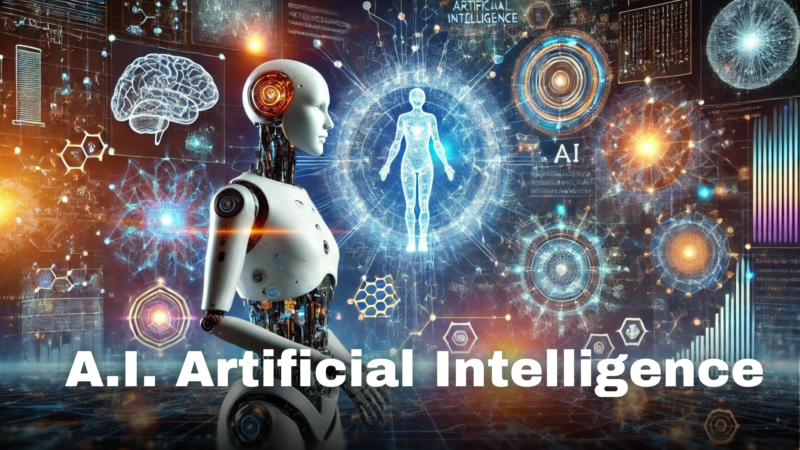A.I. Artificial Intelligence

A.I. Artificial Intelligence
A.I. Artificial Intelligence: Exploring the Future of Humanity and Machines
Artificial Intelligence grew over time beyond the imagination of a science fiction audience and started signaling the onset of modern technology. A.I. systems continue, in their improved forms, to affect our daily lives-from being voice assistants, recommending on content, and driving cars to acting robotics. However, what really is A.I., and how is it changing our space?
Understanding AI
Artificial Intelligence is the development of machines capable of imitating cognitive functions generally associated with human capabilities, such as learning, reasoning, problem-solving, and possibly creativity. Unlike traditional software mapped out by a set of rules to accomplish tasks, A.I. computations, with their algorithms, gather experience and input data to further improvement performance in many aspects over a given time. Some may refer to machine learning as a sub-field of A.I. in which such systems recognize patterns, make predictions, and even adapt without an explicit programming that tells when and where to act.
Applications of A.I. in Various Fields
Every sphere of A.I. impacts industry, which includes but is not limited to some of the following areas:
- Healthcare: A.I. medicine included, with diagnostics, drug discovery, and personalized medicine capabilities. Machine-learning models can process medical data faster and more accurately than human beings and aid doctors in decision-making.
- Finance: Above, A.I. is used in trading, fraud detection, and personal financial advisors. These systems can compute large volumes of data much faster, spotting patterns and trends, before making accurate predictions.
- Transportation: Autonomous vehicles represent one of the most recognizable applications of A.I. Self-driving cars and trucks use machine learning to operate autonomously, navigate, and avoid obstacles by adapting to road conditions with little direct human intervention.
- Customer Service: Many companies use A.I.-powered chatbots today to manage customer inquiries, freeing human employees to focus on more complex tasks. These systems produce immediate and accurate replies and learn with the shared experiences to improve them over time.
Ethical Issues and Challenges
However, A.I. does also raise some serious ethical questions and challenges. Prominent are concerns about privacy, security, and displacement of jobs. As the A.I. systems gain control over certain aspects of our lives, the operational issues of accountability and bias become extremely important. Researchers and policymakers work to ensure that A.I. is kept positive and does not promote discrimination.
Furthermore, the notion of AGI is also raising philosophical questions about the proper role of machines in society. If A.I. achieves human levels of intelligence, it raises troubling, profound questions about consciousness, the nature of humanity, and the very nature of moral responsibility. The implications of particularly strong forms of A.I. development raise legitimate fears that A.I. system takeover might not end well for people. Equity within the workplace and worker dislocation will all argue for a very serious pessimistic view on A.I.
Looking Towards The Future
The future of A.I. spells excitement but has also a certain measure of uncertainty. Progress in machine learning, natural language programming, and robotics means that many more A.I. applications are yet to come that would be even more sophisticated. This would develop into smart cities using A.I. to manage some very critical resources through predictive analytics, to a wide variety of opportunities and new breakthroughs in medicine also driven by the same predictive analytics.
However, that evolution takes place, and obviously, due attention needs to be given to the impact of A.I. on society. The more A.I. permeates existence, the more it will be necessary to weigh innovation and ethical responsibility in achieving the equitable sharing of A.I. benefits.
In conclusion, Artificial Intelligence represents one of the most transformative technologies of our epoch. It stands poised to radically alter industries, transform lives for the better, and redefine the way we interact with machines. But in traversing towards an A.I.-dominated future, societal considerations and the ethical, legal, and social implications of the oncoming technological leap would be needed to be addressed.
Important Link
- How did Kris Kristofferson die
- How to sign in bank of America online
- Millie Bobby Brown and Jake Bongiovi: A Love Story for the Ages
- India Women vs South Africa Women Cricket Match 2024
- Is Iran attacking Israel
- What happened to John Amos
- How many leagues are there in sports
- What are sports leagues
- How many times India beat Bangladesh?
Disclaimer: chronobazaar.com is created only for the purpose of education and knowledge. For any queries, disclaimer is requested to kindly contact us. We assure you we will do our best. We do not support piracy. If in any way it violates the law or there is any problem, please mail us on chronobazaar2.0@gmail.com
